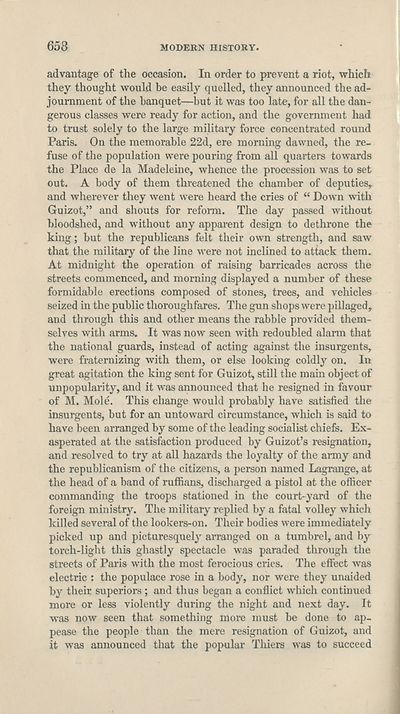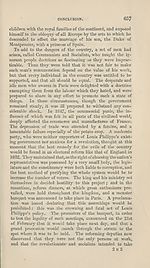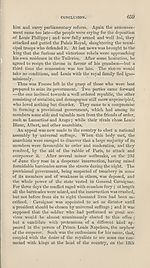Download files
Complete book:
Individual page:
Thumbnail gallery: Grid view | List view

658
MODERN HISTORY.
advantage of the occasion. In order to prevent a riot, which
they thought would be easily quelled, they announced the ad¬
journment of the banquet—but it was too late, for all the dan¬
gerous classes were ready for action, and the government had
to trust solely to the large military force concentrated round
Paris. On the memorable 22d, ere morning dawned, the re¬
fuse of the population were pouring from all quarters towards
the Place de la Madeleine, whence the procession was to set
out. A body of them threatened the chamber of deputies,
and wherever they went were heard the cries of “ Down with
Guizot,” and shouts for reform. The day passed without
bloodshed, and without any apparent design to dethrone the
king; but the republicans felt their own strength, and saw
that the military of the line were not inclined to attack them.
At midnight the operation of raising barricades across the
streets commenced, and morning displayed a number of these
formidable erections composed of stones, trees, and vehicles
seized in the public thoroughfares. The gun shops were pillaged,
and through this and other means the rabble provided them¬
selves with arms. It was now seen with redoubled alann that
the national guards, instead of acting against the insurgents,
were fraternizing with them, or else looking coldly on. In
great agitation the king sent for Guizot, still the main object of
unpopularity, and it was announced that he resigned in favour
of M. Mole. This change would probably have satisfied the
insurgents, but for an untoward circumstance, which is said to
have been arranged by some of the leading socialist chiefs. Ex¬
asperated at the satisfaction produced by Guizot’s resignation,
and resolved to try at all hazards the loyalty of the army and
the republicanism of the citizens, a person named Lagrange, at
the head of a band of ruffians, discharged a pistol at the officer
commanding the troops stationed in the court-yard of the
foreign ministry. The military replied by a fatal volley which
killed several of the lookers-on. Their bodies were immediately
picked up and picturesquely arranged on a tumbrel, and by
torch-light this ghastly spectacle was paraded through the
streets of Paris with the most ferocious cries. The effect was
electric : the populace rose in a body, nor were they unaided
by their superiors ; and thus began a conflict which continued
more or less violently during the night and next day. It
was now seen that something more must be done to ap¬
pease the people than the mere resignation of Guizot, and
it was announced that the popular Thiers was to succeed
MODERN HISTORY.
advantage of the occasion. In order to prevent a riot, which
they thought would be easily quelled, they announced the ad¬
journment of the banquet—but it was too late, for all the dan¬
gerous classes were ready for action, and the government had
to trust solely to the large military force concentrated round
Paris. On the memorable 22d, ere morning dawned, the re¬
fuse of the population were pouring from all quarters towards
the Place de la Madeleine, whence the procession was to set
out. A body of them threatened the chamber of deputies,
and wherever they went were heard the cries of “ Down with
Guizot,” and shouts for reform. The day passed without
bloodshed, and without any apparent design to dethrone the
king; but the republicans felt their own strength, and saw
that the military of the line were not inclined to attack them.
At midnight the operation of raising barricades across the
streets commenced, and morning displayed a number of these
formidable erections composed of stones, trees, and vehicles
seized in the public thoroughfares. The gun shops were pillaged,
and through this and other means the rabble provided them¬
selves with arms. It was now seen with redoubled alann that
the national guards, instead of acting against the insurgents,
were fraternizing with them, or else looking coldly on. In
great agitation the king sent for Guizot, still the main object of
unpopularity, and it was announced that he resigned in favour
of M. Mole. This change would probably have satisfied the
insurgents, but for an untoward circumstance, which is said to
have been arranged by some of the leading socialist chiefs. Ex¬
asperated at the satisfaction produced by Guizot’s resignation,
and resolved to try at all hazards the loyalty of the army and
the republicanism of the citizens, a person named Lagrange, at
the head of a band of ruffians, discharged a pistol at the officer
commanding the troops stationed in the court-yard of the
foreign ministry. The military replied by a fatal volley which
killed several of the lookers-on. Their bodies were immediately
picked up and picturesquely arranged on a tumbrel, and by
torch-light this ghastly spectacle was paraded through the
streets of Paris with the most ferocious cries. The effect was
electric : the populace rose in a body, nor were they unaided
by their superiors ; and thus began a conflict which continued
more or less violently during the night and next day. It
was now seen that something more must be done to ap¬
pease the people than the mere resignation of Guizot, and
it was announced that the popular Thiers was to succeed
Set display mode to:
![]() Universal Viewer |
Universal Viewer | ![]() Mirador |
Large image | Transcription
Mirador |
Large image | Transcription
| Antiquarian books of Scotland > Education > Elements of universal history on a new and systematic plan > (678) |
|---|
| Permanent URL | https://digital.nls.uk/127588276 |
|---|
| Description | Thousands of printed books from the Antiquarian Books of Scotland collection which dates from 1641 to the 1980s. The collection consists of 14,800 books which were published in Scotland or have a Scottish connection, e.g. through the author, printer or owner. Subjects covered include sport, education, diseases, adventure, occupations, Jacobites, politics and religion. Among the 29 languages represented are English, Gaelic, Italian, French, Russian and Swedish. |
|---|

